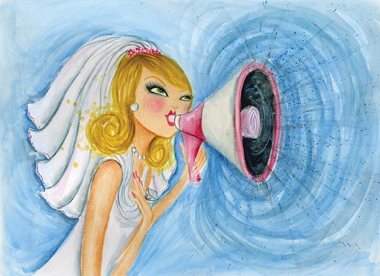原本性格隨和友善的女子在婚禮前突然變得很難伺候,哪里不滿意就要發飆,有任何小細節不到位都不行。有人說這是婚前綜合癥,而在英語里,這類人都叫做bridezilla,還是有點點嚇人的哦。
Weddings can be stressful occasions. The closer the big day approaches, the more wound-up everyone involved gets - the bride-to-be throws tantrums if every small detail of the preparations isn't perfect; the bride's father wants to take over the whole affair and run it himself, without consulting the happy couple; the bridegroom's mother, losing her son to a woman who doesn't come up to her own high standards, interferes at every turn.
婚禮一般都會給人帶來壓力。婚禮的日子越近,參與的人們就會變得越混亂——準新娘會因為某個小細節不完美而發飆;新娘的父親可能沒有征得新人同意就要接管一切婚禮事務;而新郎的母親則可能會因為要把兒子交給一個沒有達到自己高標準的女人而趁機攪局。

The English language now has words for all three of them: the pushy father is a 'dadzilla', the possessive mother a 'mumzilla', and any obnoxious bride-to-be is a 'bridezilla'.
英語里對這三類人都有了稱呼:強勢的父親叫做“爸爸哥斯拉”,不想對兒子放手的媽媽叫做“媽媽哥斯拉”,而吹毛求疵惹人厭的準新娘就叫做“新娘哥斯拉”。
This last was the coinage that started the trend, in the USA in the mid 1990s, and it can cover the whole range of bridely imperfections, from spitefulness to bridesmaids to wedding-present greed. It can be applied to bridegrooms too.
“新娘哥斯拉”是這一系列稱呼的開創者,在20世紀90年代中期最先在美國出現,這個稱呼可以涵蓋準新娘的各種劣行,從對伴娘不友善到貪圖婚禮禮物均在其中。同時,這一稱呼也可用語新郎。
The word was based, of course, on 'Godzilla', the name of a fearsome dinosaur-like monster originally created for a Japanese film in 1954.
這個詞的來源自然就是“哥斯拉(Godzilla)”了,這是1954年的一部日本電影名,指的是一種長得像恐龍、陰森恐怖的怪物。
相關閱讀
(中國日報網英語點津 Helen 編輯)